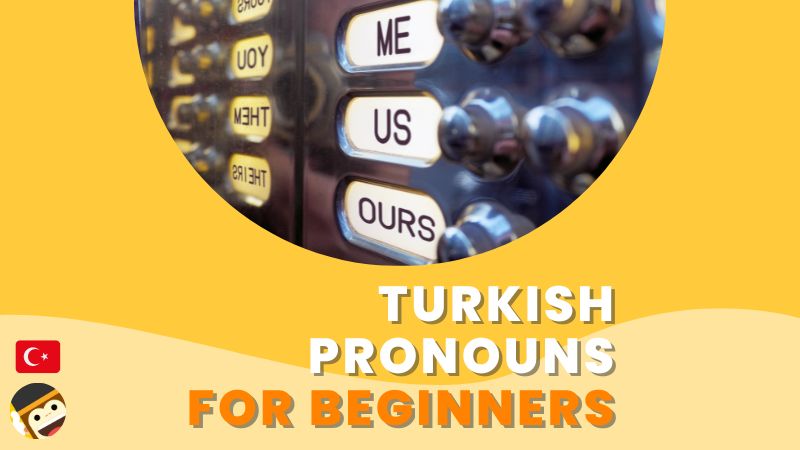Do you wonder why Turkish words end in many different suffixes and why they have no apparent subjects in some sentences? Then you should learn the Turkish pronouns as soon as possible!
English speakers find learning Turkish difficult since the sentence structure is different and Turkish is an agglutinative language. I think having a good grasp of Turkish pronouns is key to learning Turkish grammar.
If you learn the Turkish pronouns it’ll be easier to make sense of suffixes. It’s important because the Turkish language, unlike English, doesn’t require the use of subject pronouns all the time. As a matter of fact, the Turkish language prefers not to use subject pronouns regarding the economy principle in linguistics. Because it conveys the same information by suffixes.
With that being said, if you’re feeling ready to learn Turkish, let’s start to build up your Turkish vocabulary with pronouns.
Page Contents:
- What Is A Pronoun?
- Does Turkish Have Gendered Pronouns?
- Subject Pronouns In Turkish
- Possessive Pronouns In Turkish
- Demonstrative Pronouns In Turkish
- Object Pronouns In Turkish
- Reflexive Pronouns In Turkish
- Indefinite Pronouns In Turkish
- Learn Turkish With Ling App!
What Is A Pronoun?
Though it has recently been a hot word on the agenda, let’s remember what a pronoun really means in the dictionary.
A pronoun is any of a small set of words (such as I, she, he, you, it, we, or they) in a language that are used as substitutes for nouns or noun phrases and whose referents are named or understood in the context.
Does Turkish Have Gendered Pronouns?

As you know, the English language has gendered pronouns such as he and she. “He” indicates a male while “she” indicates a female. So, when you mention a third person in English, you somehow have to specify the gender.
However, there is no such thing in the Turkish language. Turkish pronouns don’t indicate genders. For example, the third person singular is “o” in Turkish and it neither indicates a male nor a female.
You may be asking; then how do you know what gender are you talking about? Well, we understand it from the context. Pure and simple. The speaker has probably told you a name before so if it was a girl’s name then the pronoun “o” indicates a female or vice versa.
If someone has a unisex name then it does cause a little confusion. For example, Deniz (meaning the sea) is a common unisex name in Turkish and people usually need to ask “is it a girl or boy?”
Subject Pronouns In Turkish
| Person | English | Turkish | Pronunciation |
|---|---|---|---|
| First singular | I | Ben | |
| Second singular | You | Sen | |
| Third singular | He/She/It | O | |
| First plural | We | Biz | |
| Second plural | You | Siz | |
| Third plural | They | Onlar |
You can see the corresponding personal suffixes for the personal pronouns in the table below.
| Turkish Subject Pronouns | Suitable Personal Suffixes |
|---|---|
| Ben | -im, -ım -um, -üm |
| Sen | -sin, -sın -sun, -sün |
| O | -dır, -dir -dur, -dür, -tır, -tir -tur, -tür |
| Biz | -iz, -ız -uz, -üz |
| Siz | -siniz, -sınız -sunuz, -sünüz |
| Onlar | -ler -lar |
Formal Pronouns
As in many other languages, the second-person plural pronoun, “siz” in Turkish, is used in formal contexts as a singular pronoun. For example, while talking to someone senior to you at work or while talking to an elder person.
Possessive Pronouns In Turkish
Possessive pronouns (my, your, her, his, our, their) indicate the owner of something without using the same noun over and over again. Check the table below to see Turkish possessive pronouns.
Demonstrative Pronouns In Turkish

The most commonly used demonstrative pronouns are “bu” and “şu” in Turkish. Similar to English, “bu” means “this” and it points to something that is near to the speaker. “Şu” means “that” it points to something far from the speaker.
Object Pronouns
Object pronouns are used instead of object nouns when we already know what that object is.
| English | Turkish | Pronunciation |
|---|---|---|
| Me | Beni/bana | / |
| You | Seni/sana | / |
| Him/her | Onu/ona | / |
| Us | Bizi/bize | / |
| You (p) | Sizi/size | / |
| Them | Onları/onlara | / |
Reflexive Pronouns In Turkish
The pronoun “kendi” (oneself) is used to put more emphasis on the subject. It’s possible to see a personal pronoun and the reflexive pronoun in the same sentence.
The reflexive word “kendi” takes on different pronoun suffixes according to the personal pronouns, as listed below.
| English | Turkish | Pronunciation |
|---|---|---|
| Myself | Kendim | |
| Yourself | Kendin | |
| Himself/herself | Kendi | |
| Ourselves | Kendimiz | |
| Yourselves (p) | Kendiniz | |
| Themselves | Kendileri |
Indefinite Pronouns In Turkish
Indefinite pronouns are used to refer to people or objects without directly saying who or what they are. They usually end with -body or -one for people, and in -thing for objects in English. However, that’s not the case in Turkish.
Learn Turkish With Ling App!
If you want to learn Turkish or any other language, waste no more time and check out the Ling App right now!

Ling is a language-learning app designed to help language learners from the beginning of their language-learning journeys. Ling App consists of different engaging activities, from writing and listening exercises to an AI chatbot to practice your speaking skills, and with much more, the Ling App offers you everything you’re looking for in a language learning app.
Also, don’t forget to visit Ling’s Turkish blog for weekly articles about the Turkish language and culture!
Trust me; you won’t regret it if you give Ling a try for FREE by downloading it from the App Store or Play Store.
Untill next time! Görüşürüz!































































